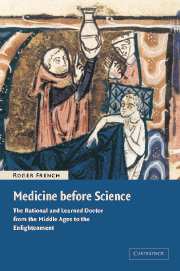8 - Enlightenment, systems and science
Published online by Cambridge University Press: 10 December 2009
Summary
INTRODUCTION
The scientific revolution of the seventeenth century has long been a centre of interest for historians of science. Traditionally, a major topic within it was astronomy, the ideal science on account of its being objective, intellectual, based on the senses, uncontaminated with contemporary unscientific things and pointing firmly to the future. This image – and the name ‘scientific revolution’ itself – are now seen to be constructions of recent historians, but the name has stuck and we are still invited to see science in the seventeenth century and celebrate its earliest exponents.
But to many observers at the time, the new doctrines were a pernicious heresy spread by men who had betrayed the old traditions of learning and piety. The new doctrines were also a minority opinion, promulgated by a handful of people limited largely to two European countries, England and Holland. Elsewhere, the men with the greatest vocational need for philosophy were the physicians, whose use of it is the subject of this book. When and if they finally absorbed the new doctrines, it was not until well into the eighteenth century, which makes a European ‘scientific revolution’ a thing of the Enlightenment.
It is only recently that the role of medicine in these changes has begun to be appreciated. There are several things we should note. First, as we have seen, the doctors had a practical use for natural philosophy and treated it as professional knowledge.
- Type
- Chapter
- Information
- Medicine before ScienceThe Business of Medicine from the Middle Ages to the Enlightenment, pp. 222 - 259Publisher: Cambridge University PressPrint publication year: 2003



